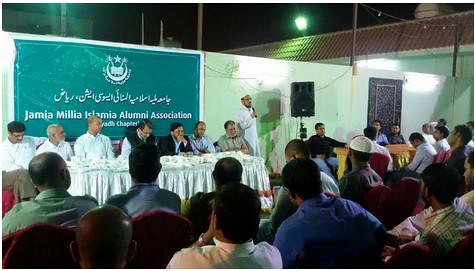By TCN News,
Riyadh: The Riyadh chapter of Jamia Millia Islamia Alumni Association held a panel discussion on the approach of Jamia’s founders towards the all-round development of Jamiaites.
“In the process of the transformation of Jamia from a humble beginning to a leading Central University (playing multifaceted roles, and also having the uniqueness of having schools under its wings), have we compromised with the focus on values and all-round development envisaged by Jamia’s founding fathers?” a statement said here.

On the occasion of Eid Milan programme held on July 23, 2015, Jamiaites in Riyadh discussed this important question in an atmosphere of informality. Panelists were Ghizal Mahdi, president of JMIAA-Riyadh, Dr Shafaatullah Khan, founding member, JMIAA-Riyadh, Salman Azmi, founding member-JMIAA-Riyadh, Zafar Bari, former general secretary, JMIAA-Riyadh, Ghufran Ahmad, senior JMI alumnus, Laique Ahmed, former vice president, JMIAA-Riyadh, and Rashid Hasan, journalist. The discussion was moderated by Ghizal Mahdi.
Introducing the topic, Mahdi said Jamia, being a product of the Indian freedom struggle, had set out to inculcate values of freedom, integrity, empathy and excellence. “Jamia was the first institution in India to apply the three-language (seh-lesaani) formula, wherein the school education was to be imparted through mother tongue; in addition, Hindi and English were taught for better national and international communication. The aim of the founders was to create socially aware, dynamic and responsive citizens; and Jamia demonstrated its social responsibility by working for the development of the local community as well as rehabilitation of riot victims (during partition and later as well),” he said.
Mahdi proposed that, in order to develop awareness about the idea of Jamia among Jamia students, a syllabus – encapsulating the history and the culture of Jamia, with emphasis on the values it stood for – be developed and made compulsory at all levels of education in Jamia.
Zafar Bari said the education should bring about desirable change and development in knowledge, skills, and attitudes of learners and added that without the Jamia school experience, the students are disadvantaged in terms of imbibing the culture of Jamia. He urged that students should actively participate in co-curricular activities like cultural and literary societies, personality development workshops and other such activities. “Weight should be given to these activities in the statement of marks. In the functions organized by Jamia, organizers should talk about the Jamia’s history, culture and values as envisaged by its founders,” he added.
Rashid Hasan informed the audience that Jamia Millia Islamia was a pioneer in the field of developing the indigenous education system in India which was independent of the existing British education system. Jamia alumni should represent enlightenment and empowerment for which Jamia stood. Hasan said that Jamia has a special character. To fulfill that role, Jamia should work towards the educational development of the underprivileged.
Ghufran Ahmad pointed out that those pursuing professional courses like engineering miss the opportunity to acquaint themselves with the values and culture of Jamia.
Salman Azmi, who graduated from Jamia’s school in the 1970s, recalled the approach to education in the school in those days. He said that the focus was on the all-round development of students. He said that students used to organize “aek din ka madarsah” (One Day School) in which students showcased their organizing skills.
Dr Shafaatullah Khan, who has had long association with Jamia as a student and staff member, impressed upon the need to adopt values like punctuality, grooming, good manners and proper dress sense and develop other soft skills in order to become effective individuals. He urged Jamiaites to show basic courtesies like responding to emails, phone calls and messages.
Among the audience, Sabahuddin supported the idea of teaching Urdu to students of professional courses to improve their pronunciation.
Haroon Quasmi emphasized that since Islam is in the name of Jamia, Islamic values such as honesty, integrity, justice and moral values should be inculcated in students.
Anayatullah, a recent graduate from Leh shared his life-changing and enriching experience at Jamia. He talked about how Jamia changed his world view and expanded his horizons in terms of thought and action. Mohammad Rahbar, Shabbir Nadwi, and Ali Mohtashim also expressed their views on the occasion.
The programme began with a recitation from the Holy Quran by JMIAA Riyadh treasurer Abdul Rahman. Before sumptuous dinner was served, some members demonstrated their taste in Urdu poetry. Prominent participants were Haroon Qasmi, Abdul Rahman, Shabbir Nadwi, Rashid Hasan, Mohammed Nisar, Sabahuddin, Izhar Hussain, Imdad Alam, Saba Arif, Javed Akhtar, Mohammed Rahbar and Zabeehullah.
Mahdi introduced 26 new Jamiaites, who recently arrived in Riyadh and joined the Alumni Association. Najeeb Qasmi, a senior Jamiaite, presented Association’s Eid-gifts to children, the statement added.

